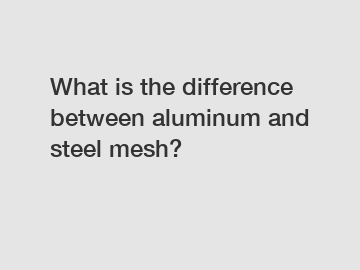Dec. 15, 2023
Minerals
What is the difference between aluminum and steel mesh?
When it comes to choosing the right material for mesh applications, two popular choices are aluminum and steel. While both materials have their strengths and weaknesses, understanding the differences between them is crucial in selecting the most suitable option for your specific needs. So, let's delve into the dissimilarities between aluminum and steel mesh and explore the advantages and disadvantages of each.
1. Durability:

Aluminum mesh is generally lighter in weight compared to steel mesh. This characteristic makes it ideal for applications where weight is a concern, such as aerospace or automotive industries. However, steel mesh is notably stronger and more durable than aluminum. It can withstand higher levels of impact and provides better resistance to wear and tear. Thus, steel mesh is commonly used in heavy-duty applications and environments that require high strength.
2. Corrosion Resistance:
Another significant difference between aluminum and steel mesh lies in their resistance to corrosion. Aluminum is naturally corrosion-resistant due to its oxide layer, which forms when it comes into contact with oxygen. This oxide layer helps protect the metal from oxidization, making aluminum mesh suitable for outdoor applications where exposure to moisture or humidity is a concern. On the other hand, steel is prone to corrosion without proper protective coatings. However, when coated with materials such as zinc or galvanized finish, steel mesh can provide excellent corrosion resistance.
Further reading:3. Conductivity:
Electrical conductivity is another factor to consider when choosing between aluminum and steel mesh. Aluminum is an excellent conductor of electricity and is often preferred in applications where electrical conductivity is desired, such as electrical enclosures or transmission lines. Steel, on the other hand, is not as conductive as aluminum. In certain situations where electrical conductivity is not required, steel mesh may be the preferred choice due to its other advantageous properties.
4. Aesthetic Appeal:
The aesthetic aspect is essential when it comes to choosing the right mesh material for certain applications. Aluminum mesh offers a sleek and modern appearance due to its inherent metallic finish. It is often used in architectural settings and interior design applications. Steel mesh, on the other hand, provides a more industrial and rugged look, which makes it suitable for applications where aesthetics take a backseat to functionality, such as industrial fencing or machine guarding.
In conclusion, understanding the difference between aluminum and steel mesh is crucial in determining which material is best suited for specific applications. While aluminum mesh offers advantages in terms of weight, corrosion resistance, and conductivity, steel mesh provides superior strength, durability, and a more rugged aesthetic appeal. Consider the requirements of your project and weigh the pros and cons of each material before making your decision.
So, when you ask, "What is the difference between aluminum and steel mesh?" the answer boils down to considering factors such as durability, corrosion resistance, conductivity, and aesthetic appeal. By carefully evaluating these aspects, you can make an informed decision and choose the right mesh material for your needs.
The company is the world’s best zirconia ceramic foam filter, porous ceramic filter, application of fiberglass filter supplier. We are your one-stop shop for all needs. Our staff are highly-specialized and will help you find the product you need.
Further reading:Previous: Are security screens bullet proof?
Related Articles
If you are interested in sending in a Guest Blogger Submission,welcome to write for us!
All Comments ( 0 )